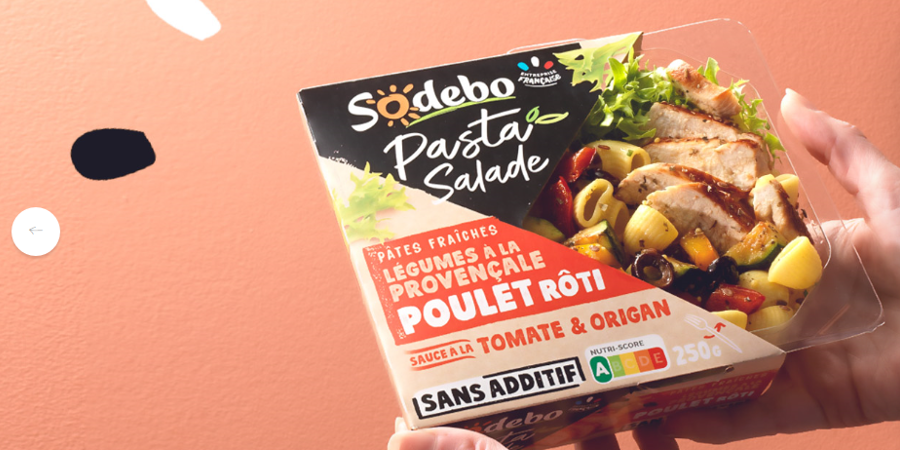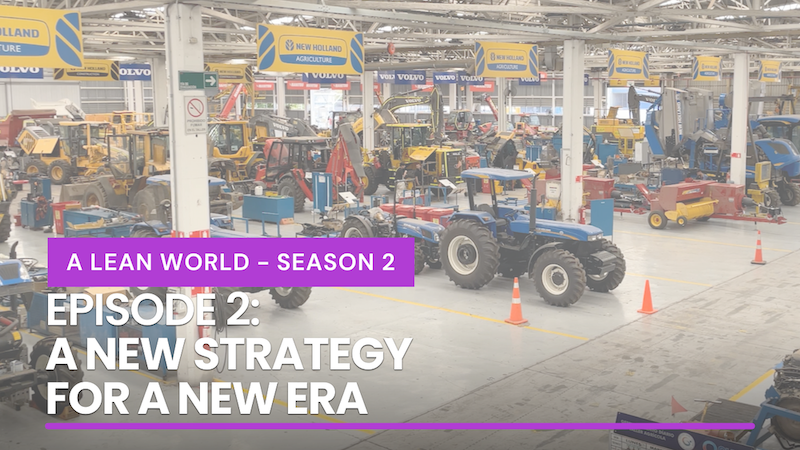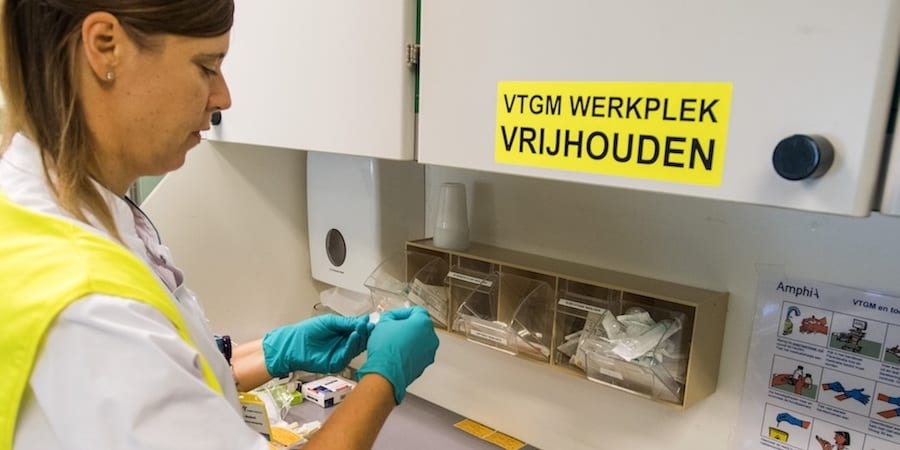
Facing the crisis with an appetite for improvement
NOTES FROM THE VIRTUAL GEMBA – Despite a 40% drop in sales and the looming prospect of having to furlough part of its staff, this French company is finding in Lean Thinking an ally to fight the current crisis.
Words: Catherine Chabiron, lean author and member of Institut Lean France
All around the world, healthcare workers have been fighting for us all with dedication and professionalism. We owe them a debt of gratitude. But there are other, less visible areas in our economy that we have been heavily relying on – one of them being the food supply chain. With restaurants, open-air markets and other food outlets forced to shut down, hundreds of millions of us are left with local shops and supermarkets. Many of them are just as strained with the effort and stressed by the risks as the healthcare teams.
My virtual gemba today is a bit upstream in the chain, a food processing business called Sodebo that sells fresh pizzas, pastas, salads and sandwiches in supermarkets, service stations, airports, railway stations and many other outlets. Or at least they were, as the lockdown has severely restricted distribution channels.
The story of Sodebo is amazing. The family business started as a local delicatessen catering for weddings and family parties in a very small town south of Nantes, France. Back in 1970s, they came up with a fresh pizza to sell in supermarkets that proved a great success. They launched daring investment programs to expand capacity in the 1990s, opened new facilities for a range of fresh sandwiches in 1999, branched out into pastas in 2009 and salads in 2012. They have grown from an unknown local caterer to a company with a turnover of half a billion Euros that delivers to all French regions. They are currently expanding their business to Belgium and Brazil. Today, Sodebo is run by the three daughters of the founders, a rare example of co-management and of women in leadership for a company of this size.
LEARNING WITH LEAN
I have already walked the gemba in Sodebo with sisters and co-managers Bénédicte Mercier, Marie Laurence Gouraud and Patricia Brochard, but right now a video conference will have to do.
Bénédicte, Marie-Laurence and Patricia began a lean transformation around a year ago, upon seeing that their cycles of major investments followed by the quick penetration into new markets with a profitable growth were slowing down. Additionally, the growing business had reached a certain size (2,500 employees) and they could clearly see a budding bureaucratic system starting to push back at their requests for changes, new initiatives or innovation.
Ballé, Jones, Chaize and Fiume describe this as the iron law in The Lean Strategy.

Marie-Laurence, who is responsible for all production and supply activities, confirms that Lean Thinking was an eye opener on a number of things that didn’t work:
- Genchi genbutsu demonstrated that customer claims were professionally received and compensated, but no one acted on the root causes. This led Sodebo to reconsider how to work on quality at each step of the production, including the boundary conditions of what is a good product and what isn’t or to start implementing Jidoka on the machines.
- Experimentation with levelled pulled flows in Salads highlighted the difficult balance they needed to strike between comfort for the production teams (predictable, levelled production) and the need to deliver fresh products (which means products couldn’t be stored in the shopstocks more than a few hours). This led to work on changeovers with SMED (Single Minute Exchange of Dye) and to the discovery that the lines were not flexible enough.
- Collaboration between production, supply chain, engineering, marketing, sales and other support functions was not fluid. A central obeya was created and training on key functional leaders introduced.
SALES DOWN
Our discussion via video conference starts with the bare facts. “Our sales are down 35 to 40%”, Patricia begins. She supervises finance, marketing, sales and innovation. “With everyone staying at home, our sandwiches are no longer needed. Salads and pasta are down too, since there are obvious possible substitutes at home. Pizzas, however, are up. They are typical family meals.” She adds with a smile that fresh pizzas – their flagship product – was one of their concerns lately, before the lockdown. In fact, the recovery of their pizza sales was one of the key targets for 2020 in the central obeya. The lockdown took care of the problem.
The decisions made in the very early days of the crisis to protect employees were in push mode: the team needed to act quickly for all those employees who were still coming to work. Production and supply are obviously on site and, after the first few days (when everyone had to figure out a way to manage home-schooling, remote working and coming to the office), the vast majority of the employees were doing the same. Frequent hand washing, social distancing and the use of masks have been implemented everywhere. This was not as easy as it sounds. Operators were worried to work in the production site at first, but the protective measures quickly convinced them it was okay to do so. (Early in the lockdown, HR reported there were 30 people in the company with possible Covid-19 symptoms. As of yesterday, that number was three – proof that working conditions are safe).
Operating in the food sector meant that Sodebo was fairly well prepared when Covid-19 appeared: production already operated under strict rules that included face masks, sanitizing gels, protective gear and low temperatures on site. You can’t find a washbasin with taps at Sodebo: the flow of water is controlled by a rod pushed with the knee. Still, new sanitizing and distancing rules had to be implemented to avoid contact between employees, in the changing rooms (like staggered arrival times) and all common areas.
Bénédicte, who supervises HR and Purchasing, says: “Our lean experience has increased our awareness on the need to develop team autonomy and to tap into each person’s creativity. We needed to act urgently on those sanitizing rules but can’t continue in push mode. We must hand over the sanitizing and distancing standards to the teams through kaizen.”

A matrix detailing what is expected of employees and what protective measures or behaviors are useful at any one time during the working day encourages the teams to engage in kaizen activities related to sanitizing practices and social distancing: how does each team define how to deal with the new rules? How do they periodically revise their standards? How do they fight force of habit and slippage?
Sanitizing-focused kaizen led to another idea: the three co-managing sisters know they need to accept stress, show empathy, and help provide direction in such an unprecedented situation. They therefore decided to launch a weekly lockdown newsletter outlining all the local initiatives taken by the teams to improve the situation and support those who are most exposed to risk.
One such initiative, in the early days of the lockdown, took care of the supply of a hydro-alcoholic solution that is crucial to protect employees but also to food processing activities. None could be purchased on the market and a chemist degree was needed internally to supervise such a process. The operating teams looked around and a team member with the required qualifications was identified: the company’s lab is now in a position to produce the amount of solutions Sodebo needs for the next three months. It is also 3D-printing visors to use within the company and to donate to healthcare staff.

Facility management teams used to focus their work on very different activities, such as gardening, cooking for the cafeteria or cleaning. They pulled the available resources in the early days to staff the sanitizing commandos and massively a lot from each other. The cafeteria has now re-opened and Sodebo is quickly learning how to deal with communal eating in a Covid-19 context: spaced-out seats, individual pre-packaged dishes, packed forks, surface sanitizing. Buffets are not allowed, as is serving items that come in self-service baskets or dispensers – such as bread, salt and pepper or vinaigrette.
With the unexpected drop in sales, recycling accessories embedded in unsold food packages (such as forks, cookies or salad dressings) or freezing unused raw materials for future re-use is another interesting initiative to try and reduce costs. The focus on waste elimination is consequently increasing and should promote further learning and kaizen on the subject.

Sodebo is very transparent about the current state of things and the drop in sales, so that each employee can grasp the problem and figure out how they can help. Many, for example, contributed by distributing the food in excess (which could not be sold after the lockdown was announced) to hospitals, truck drivers and delivery people.
These initiatives demonstrate the creativity of the teams and publishing them in the weekly newsletter boosts pride in one’s work and gives meaning to the effort of each individual. In addition to the newsletter, a “Thank you” wall has been set up in each communal area and thank you notes are posted there on a daily basis.
With the lockdown now in its second month, however, Marie Laurence, Patricia and Bénédicte anticipate another issue. They can no longer delay asking a number of their employees to stay home under an unemployment scheme funded by government. With sales having dropped 40%, and after exhausting all possible solutions (like cash facilities, less seasonal recruitment, reinforcing production lines in high demand, kaizen, training and vacation), unfortunately it’s now time to move to the next stage. They also know this could worsen the gap between those who continue to work and those who stay at home. As a result, they asked the teams to try and alternate unemployment and work, keeping in mind the individual dire situations some of their colleagues face and trying to keep everyone in the game. They want to be in a position to guarantee jobs when the crisis comes to an end.
BUILDING THE FUTURE
Kaizen has not stopped at Sodebo. This is a great way to fight grief and turn the common sense of loss into something positive that paves the way for a brighter future. The pull flow in the Salads area had been temporarily interrupted due to the huge swing in the demand of the product mix for which the planning teams couldn’t calculate a takt time (they reverted to a hectic make-to-order), but it is now resuming. In the meantime, the idle time has been used to solve problems or work on standards.

With the increase in the pizza turnover, the Sodebo team also had to find ways to staff the lines overnight, train new operators, organize the changing rooms, and design marks on the floor to comply with social distancing restrictions. Keeping the distance was an issue with new staff as questions and request for help were constantly appearing. A suggestion was made and immediately implemented: to use the transmitters and receivers designed for plant visitors, so that seasoned employees could advise learners on the line, while feeding components or operating five meters away.
New product launches had been scheduled in April and a few of them were maintained and are currently being monitored closely. The new Pasta Salad, for example, is starting in manual slow build, offering time to spot issues and test ideas. For the first time, a new product is not launched on a dedicated line but shares an existing salad line, forcing the teams to up their SMED game and increase the flexibility of the line.
New lockdown consuming needs are also being identified and addressed. With kids at home, sales of flour, eggs and pie dough have increased in supermarkets, and bread is now in very high demand. Sodebo has been able to adapt to this and has started to sell semi-finished products, such as sandwich bread (which makes sense at least as long as the lockdown lasts).
With limited distribution channels, Sodebo also took a step towards home deliveries, which they had been thinking about for a while. It is for the time being limited to the Nantes region and Patricia, Marie-Laurence, and Bénédicte only see this as an experiment at this stage. Yet, solving customers problems is also a renewed opportunity to learn a new trade or enter a new market, which can be useful in the future.
Protecting employees, but also treating them like responsible adults and asking them to take over standards and their sustainment over time. Acknowledging their grief and stress, but also building positive initiatives, promoting kaizen and working on improvements for a better tomorrow. This is how Sodebo is planning to move forward and tread its way through this crisis.
THE AUTHOR

Read more


FEATURE – What makes a mentor-mentee relationship successful? This intimate account comes all of the way from a Tanzania healthcare organization, and proves how lean is fundamentally about “caring for people.”


ARTICLE - How can creativity and standards coexist? How do we move beyond silos? How do we fully understand the voice of the customer? Dan Jones reflects on three key questions for the lean movement.


WEB SERIES – In the second episode of our docuseries on lean in Chile, we learn how, with a clear purpose and strong commitment from leadership, SKC is transforming its processes and mindset and building a competitive advantage.


INTERVIEW – Bringing nurses together and giving them a space to discuss problems on a regular basis has allowed this hospital in Holland to successfully embrace lean thinking and reap its benefits.

